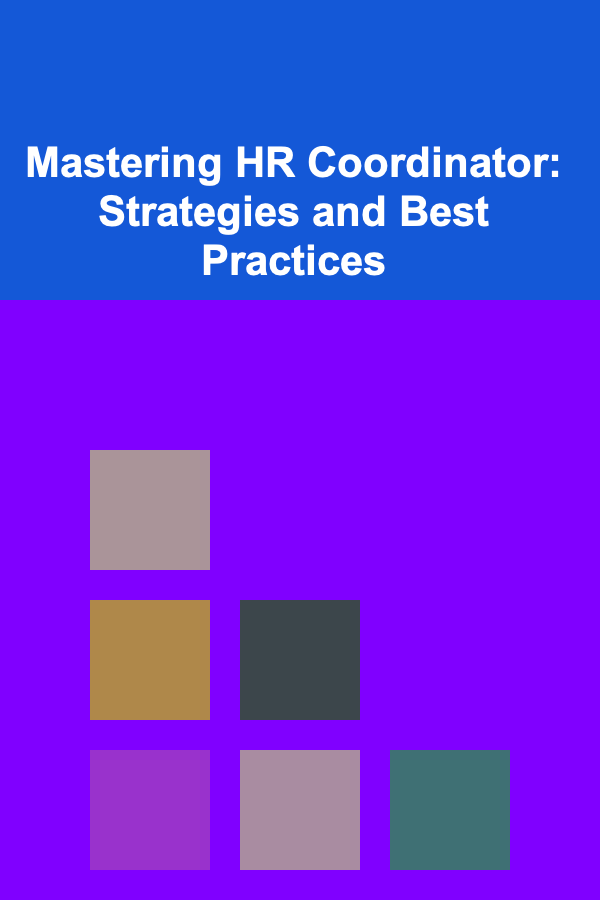
Mastering HR Coordinator: Strategies and Best Practices
ebook include PDF & Audio bundle (Micro Guide)
$12.99$9.99
Limited Time Offer! Order within the next:

The role of an HR Coordinator is pivotal in any organization. Acting as the bridge between the employees and the management, HR Coordinators play a significant part in the human resources function, ensuring the smooth operation of daily HR activities. They manage recruitment, onboarding, employee relations, compliance, and much more. Their effectiveness can greatly impact organizational performance, employee satisfaction, and overall business success.
To excel as an HR Coordinator, one needs a blend of interpersonal skills, organizational abilities, and a deep understanding of HR principles and best practices. This guide offers actionable strategies and best practices that will help HR Coordinators master their role and contribute to their organization's growth.
Core Responsibilities of an HR Coordinator
An HR Coordinator wears many hats and is often involved in several functions within human resources. Some of the primary duties include:
- Recruitment and Staffing: Managing the process of attracting, interviewing, and hiring candidates.
- Onboarding: Ensuring that new hires are properly introduced to the organization, its culture, and their roles.
- Employee Records and Data Management: Keeping detailed records of employees, including performance reviews, benefits enrollment, and attendance.
- Employee Relations: Addressing employee concerns, managing conflicts, and ensuring a positive work environment.
- Training and Development: Coordinating training programs to enhance employee skills and support career development.
- Compliance: Ensuring the organization follows all relevant laws and regulations, such as labor laws, health and safety standards, and equal employment opportunity rules.
Given the variety of tasks, HR Coordinators need to be adaptable, organized, and proactive. They must possess a well-rounded skill set and continuously seek to improve their methods for handling day-to-day HR operations.
Strategies for Mastering the Role of an HR Coordinator
1. Develop a Strong Understanding of HR Policies and Procedures
To be an effective HR Coordinator, you must thoroughly understand your organization's HR policies, procedures, and practices. This foundational knowledge ensures you can manage HR functions with consistency and compliance.
Actionable Steps:
- Study your organization's Employee Handbook: Familiarize yourself with key policies such as recruitment processes, time-off policies, disciplinary actions, and conflict resolution protocols.
- Stay Updated with Labor Laws and Regulations: Laws regarding employee rights, workplace safety, and wage laws evolve frequently. Continuously educate yourself to ensure your practices are in line with legal requirements.
- Attend HR Training and Workshops: Consider joining HR networks, attending workshops, or earning certifications that keep you up to date on HR trends and legal requirements.
2. Enhance Your Communication Skills
An HR Coordinator interacts with many people, including employees, managers, candidates, and external partners. Strong communication skills are essential to building relationships, managing expectations, and resolving conflicts.
Actionable Steps:
- Practice Active Listening: Pay close attention to employee concerns, complaints, or feedback and ensure you fully understand the situation before taking action. This builds trust and shows that you value input.
- Adapt Your Communication Style: Tailor your communication to the audience. When talking to managers, focus on strategic solutions. When working with employees, use more approachable language and emphasize empathy.
- Use Clear and Concise Language: Avoid jargon or overly complicated language. Whether writing emails, creating policies, or conducting interviews, ensure that your messages are easily understood by all stakeholders.
3. Leverage HR Technology and Tools
Technology plays an increasingly vital role in modern HR management. HR software systems streamline many HR functions, from payroll and performance tracking to recruitment and employee self-service portals. Understanding how to use HR tools effectively can make a significant difference in efficiency.
Actionable Steps:
- Familiarize Yourself with HR Software: Learn how to use applicant tracking systems (ATS), performance management tools, and HR management software (HRMS). These platforms can automate repetitive tasks, reduce errors, and improve data accuracy.
- Use Analytics for Better Decision-Making: Take advantage of HR analytics to gain insights into employee performance, turnover rates, and other key metrics. These insights can help you identify trends, address challenges, and improve HR practices.
- Integrate Employee Self-Service Systems: Implement tools that allow employees to access their personal information, submit leave requests, or update benefits information without needing HR intervention. This will free up time for more strategic tasks.
4. Streamline the Recruitment and Onboarding Process
Recruitment and onboarding are often the first touchpoints that employees have with your company. A smooth, efficient process not only improves the employee experience but also sets the tone for long-term engagement and retention.
Actionable Steps:
- Develop a Clear Job Description Template: Having a well-defined job description that outlines key responsibilities, qualifications, and expectations will help you attract the right candidates. A clear job description also ensures that interview questions are aligned with the role.
- Refine Your Interviewing Process: Standardize interview questions and evaluation criteria to ensure fairness and consistency. Use behavioral interview techniques to assess how candidates have handled situations in the past and how they might perform in your company's context.
- Create an Engaging Onboarding Program: Onboarding should be more than just filling out paperwork. Develop a comprehensive onboarding process that includes company culture introduction, role-specific training, and a mentor or buddy system. The goal is to help new hires feel supported and integrated into the team right from the start.
5. Master Employee Relations and Conflict Resolution
Managing employee relations effectively is one of the most critical tasks of an HR Coordinator. Conflict, misunderstandings, and grievances are inevitable in any workplace, and how you handle them can make a huge difference in morale and productivity.
Actionable Steps:
- Be Approachable and Neutral: Employees should feel comfortable coming to you with concerns or conflicts. Always remain neutral and objective, focusing on finding a resolution that's fair to all parties involved.
- Address Issues Early: When conflicts or concerns arise, address them promptly before they escalate. Waiting too long can lead to resentment and negative impacts on team dynamics.
- Provide Training on Conflict Management: Equip your employees and managers with conflict-resolution skills by offering workshops on communication, mediation, and de-escalation techniques.
6. Focus on Employee Engagement and Retention
Retaining talented employees is a major goal for HR, as high turnover can be costly for any organization. Engaged employees are more likely to stay, perform well, and contribute to a positive work culture.
Actionable Steps:
- Conduct Regular Employee Surveys: Use surveys to gauge employee satisfaction and identify areas for improvement. Focus on factors such as work-life balance, job satisfaction, and opportunities for growth.
- Implement Recognition Programs: Employees who feel appreciated are more likely to stay engaged. Develop recognition programs that reward outstanding performance, whether through formal awards or informal praise.
- Promote Professional Development: Employees who see opportunities for growth within the company are more likely to stay long-term. Coordinate training programs, career development resources, and mentorship opportunities that align with employees' aspirations.
7. Stay Proactive and Organizationally Agile
As the business landscape evolves, so too must the HR function. Being a proactive HR Coordinator means anticipating the needs of the organization and the workforce and responding with solutions that are forward-thinking and adaptable.
Actionable Steps:
- Monitor Industry Trends: Keep track of HR trends, best practices, and emerging technologies that could improve the way you work. Regularly attend webinars, read HR publications, and network with HR professionals to stay informed.
- Adopt Flexible Work Solutions: The rise of remote work and flexible hours presents a new challenge for HR professionals. Ensure that your policies and technology are adaptable to different working conditions, and foster a culture of flexibility and trust.
- Build a Contingency Plan: Prepare for unforeseen circumstances, such as staffing shortages, economic shifts, or compliance changes. Having a contingency plan in place will allow you to respond quickly and effectively when challenges arise.
Conclusion
Mastering the role of an HR Coordinator is an ongoing process of learning, adaptation, and improvement. By focusing on key areas such as communication, compliance, recruitment, employee relations, and leveraging technology, you can elevate your HR function and contribute significantly to your organization's success.
In this dynamic and fast-paced role, the best HR Coordinators are those who stay proactive, develop strong relationships with employees and managers, and embrace continuous development. By implementing the strategies and best practices outlined in this guide, you can build a foundation for long-term success in your career and create a more productive, engaged, and compliant workforce.
Reading More From Our Other Websites
- [Horseback Riding Tip 101] How to Care for and Maintain Your Horse Riding Boots for Longevity
- [Biking 101] How to Maintain and Care for Your Vintage Bikes
- [Home Security 101] How to Prevent Break-ins with Better Outdoor Security Practices
- [Home Rental Property 101] How to Handle Security Deposits and Avoid Legal Issues
- [Home Storage Solution 101] How to Build or Modify a Toy Chest to Maximize Storage and Functionality
- [Whitewater Rafting Tip 101] Top 10 Essential Safety Tips Every Rafting Enthusiast Should Know
- [Personal Investment 101] How to Invest in Royalties & Intellectual Property
- [Home Family Activity 101] How to Build a Family-Friendly Movie Night at Home
- [Rock Climbing Tip 101] Safety First: Mastering Trust and Rescue Techniques with Your Climbing Partner
- [Home Storage Solution 101] How to Organize Your Shoes with Creative Storage Ideas for Any Space

How To Get Better at Deduction Games
Read More
How to Use Drawer Dividers for Tidy Kitchen Storage
Read More
Mastering E-Learning: Advanced Techniques for Enhancing Virtual Education and Training
Read More
How To Understand the Basics of DNA and RNA
Read More
Developing VR for Manufacturing: A Deep Dive
Read More
How to Choose the Right Running Shoes for Your Foot Type
Read MoreOther Products

How To Get Better at Deduction Games
Read More
How to Use Drawer Dividers for Tidy Kitchen Storage
Read More
Mastering E-Learning: Advanced Techniques for Enhancing Virtual Education and Training
Read More
How To Understand the Basics of DNA and RNA
Read More
Developing VR for Manufacturing: A Deep Dive
Read More